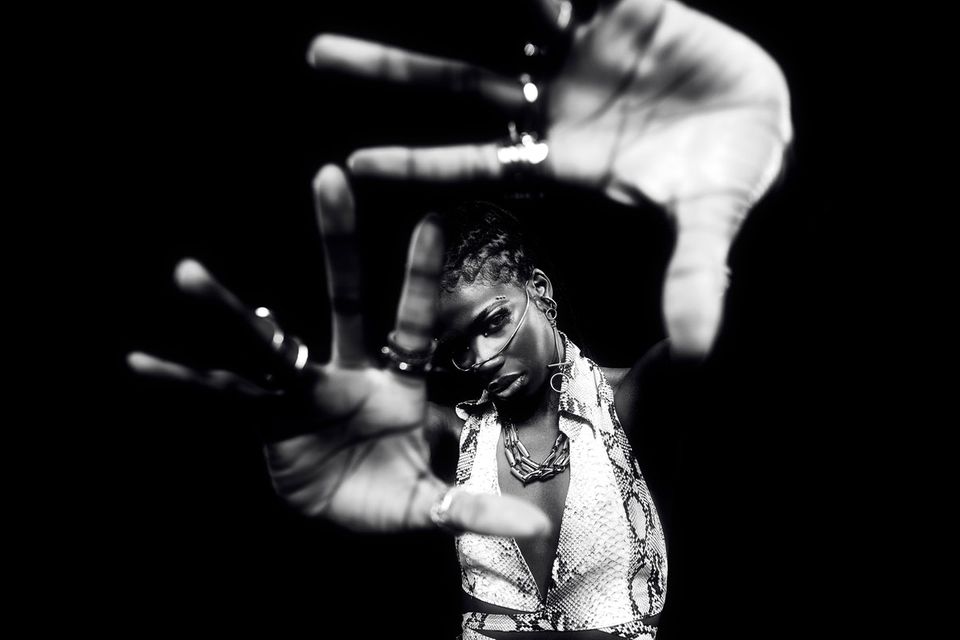Dabrye Reboots The Beat Tape
Tadd Mullinix revives his hip-hop moniker for 'Super-Cassette.' w/ reviews of Chyna Streetz + Midi Neutron.

Tadd Mullinix never intended to stop being Dabrye. Nor did the Michigan native have any methodically preset plans for a grand return to his venerated hip-hop production moniker. Yet this month, more than six years after the release of 2018's guest-heavy Three/Three, he delivered a brand new album entitled Super-Cassette via longtime label home Ghostly International.
"I can't remember the one point that I just said, okay, this is it," Mullinix says. "Some of my fans had tapped me online and said, I love all your shit, but I'd love to hear an instrumental thing again." Coupled with a low pressure inquiry from Ghostly founder Sam Valenti IV, he figured it was as good a time as any to formally revive the project. Thankfully, he hadn't ever really stopped working on potential Dabrye material. "I always had it in the back of my head to be making beats."
Yet despite what some in his audience might expect from him, based on prior records like 2001's seminal breakthrough One/Three and its 2006 successor Two/Three, Mullinix wasn't particularly interested in repeating himself. Indeed, the Dabrye album trilogy itself bears that out, beginning with the initial instrumental set and following with two decided more rap-oriented installments featuring Ghostface Killah, MF DOOM, and Vast Aire, among others. With those three releases, he'd demonstrably honed a sound of his own, one inspired by The Ummah and specifically Detroit's own Jay Dee (aka J Dilla) but still ambitious and exploratory on his own distinct path.
The appeal of doing a project without vocalists this time around was strong, and not without precedent in the Dabrye catalog. More than two decades earlier, he'd released the self-explanatory Instrmntl on Scott "Prefuse 73" Herren's Eastern Developments label, expanding upon One/Three but also diverging from it by incorporating elements from genres other than hip-hop. In preparing Super-Cassette, he wanted to push things further in a manner that reflected his contemporary interests.
"I had specific things in mind that I wasn't really diving into in my initial release and the second one on Eastern Developments," he says, adding, "I get very concise and detail oriented when it comes to this stuff."
One need not spend too much time with Super-Cassette to hear that meticulous work ethic in action. From the muted, ATCQ-esque opener "The Most Deliciousest" to the icy and dubwise "Whoever Got You’s Gonna Get Got Too," Mullinix flips the Dabrye script to great effect, with subtle touches that emerge on repeat listens. More maximalist than what comes before, the closing cut "Rigby's Dram" throws things back to hip-hop's 1980s glory, bubbling with retro-electro flourishes and rugged drum machine nostalgia. Originally, he thought of the song as more of a segue or detour, putting it far earlier on the record before eventually sequencing it as the album's tidy coda. "It's a really lighthearted, fun, partially drunk sounding type of thing," he says. "That just seemed like the right way to end it."
No mere interlude, the noticeably beat-less "Fantastic Clouds" employs piano as its main driver, but uses his relatively recent interest in field recording to good use. "I wanted to simulate the sound of the brush on a snare you would hear in a jazz song–and I have a brush but I don't have a snare," he explains. "So I got my new gear and I went outside and grabbed a branch. I struck it on the ground and I swirled it around like one would a brush on a snare."
Among the set's standout moments is "Yaya," a beauteous four minutes of slices and chops that feel somehow organic and even acoustic. From Mullinix's perspective, it reflects an evolution of his production origins with shareware tracker software. "I was a broke little skater punk kid, and my friend taught me how to use a function called sample offset, which is [where] you're changing the starting point of a sample when it's being triggered basically," he recalls. The limitations of trackers in those days let him to use this function in an unorthodox manner to emulate how a live musician might play and, specifically, make mistakes.
"You just create a little bit of variation there so that the key strikes a little early or a little late each time, but with that comes all the artifacts of a sample. I'd start to hear whatever happened just before that key is struck, so that creates a lot of glitch or idiosyncrasies in the music."
With "Yaya," he persists along these lines, with gratifying results. "I've been changing it for every pattern, and it builds to something. I don't know if there's an apex, but it reaches a point here and there that's extremely satisfying to me."
In the intervening years between Three/Three and Super-Cassette, Mullinix certainly hasn't been idle, recording and releasing music outside of hip-hop via his myriad aliases such as James T. Cotton (JTC) and X-Altera, occasionally through his proprietary Bopside imprint. Despite how prolific an artist his discography may make him appear to be, he rejects that claim and favors a deliberate slowness to his creative process. "I need to incubate ideas and I need things to rest," he says, running counter to the hyperactive hustle mentality that so many beat makers labor underneath. "It's just the way I work, so I can't really kick it out that much."
Still, Mullinix has to wonder whether the hyper-segmentation of his music into distinct monikers is more curse than blessing in his overall career journey. In his younger years, he likened divvying up project names by genre to diversifying his proverbial portfolio of work in the hopes that something would take. "Maybe it's to my detriment," he says reflectively of these choices. "I'm going to go off and do other things, and people aren't going to get it. I'm not going to be able to bring JTC heads into the Dabrye thing."
Ultimately, regardless of his sometimes metaphorical wardrobe of outfits, he can't dwell too much on practicality or pragmatism when it comes to his art. "I have a hard time denying myself the creative freedom of doing whatever I want," he says. "It's way for me to escape and for me to keep my mind away from bad thoughts. If I'm not doing what I want to musically, it feels like a burden.
"I don't know how artists do one thing. I don't understand it."

Chyna Streetz & 183rd, From Hell To Chanel (buy it / stream it)
In an increasingly crowded hip-hop marketplace of baddies, scammers, and thug misses, Chyna Streetz stands out in the best way possible. Upending the ride-or-die archetype with frank lyrics and a palpable sense of self-worth, the New York native compels listeners to reconsider their presumptions on From Hell To Chanel. Produced by the under-appreciated 183rd, her must-hear album showcases her casually delivered yet magnificently authentic bars against a modernized boom bap backdrop. Scornful soul slappers "Bernadine's Rage" and "Entitled" exude ruggedness matched by her emboldened, matter-of-fact demeanor. Standout cut "Sirens Lullaby" balances an inspired West Coast beat flip with cool confidence and words of caution, while the minute-long "Dark Night Of Soul" adds maximalist '80s Scarface overtones to a densely-packed verse. Even with solid features from Rome Streetz and OX OMNI, it's Tiona Deniece who impresses the most, her "Judas Kiss" chorus gorgeously encapsulating the album's ethos.
Midi Neutron, ikeru (buy it / stream it)
Electronic music producer Midi Neutron brings a collaborative spirit to his far-out new album. Mixing trippy jazz and leftfield hip-hop in willfully disproportionate measures, ikeru places the New York based, Japanese-American artist at the center of a revolving cast of talents. He employs vocalists and rappers, bassists and saxophonists, all manner of underground music scene creatives to complete his eclectic mini-opus. The PTP affiliated Nakama executes mind-bending bars to "Diminishing Returns" and the mystifying digital errorzone "Signal Loss," while his Poetic Thrust cohort Yoh offers up some itchy palm existentialism on the warbling lo-fi cut "Rewinds." A fusion fit for supper club late nights emerges with the slow building "Where We've Been," a centerpiece worth its sequenced position. A rare moment just for Midi himself, "Shuffle Till I'm There" plinks and plonks along like a long lost Plaid track.


Three new tracks for you to snack on...
Raf-Saperra, "Hood Harvest (feat. Dave East & Big Body Bes)"
Wynne & WowGr8, "Cut & Paste"
ElCamino & Real Bad Man, "Champagne Pisses (feat. Benny The Butcher)"





